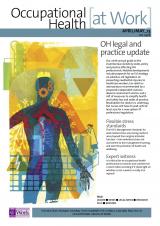April/May 2013 (vol. 09/6)
ContentsFeaturesNewsLegal
NewsResearch DigestResearch PlusCPD
Research Plus
Depression leads to poor employment outcomes
A seven-year longitudinal study of 5,785 employed people (aged 40–50 years) in Denmark found that those with depressive symptoms coupled with high physical work demands were more likely to take sick leave (OR = 2.97; 95% CI 2.19–4.03), be unemployed (OR = 3.09; CI 2.21–4.31), and be work disabled (OR = 3.39; CI 2.17–5.28), but were not at significant increased risk of job change. However, the combined effect did not exceed the single effects and there was no interaction effect; in other words the disabling effect of depressive symptoms occurs irrespective of work demands. ‘Action against employment consequences of depressive symptoms should not be restricted to areas of high work stress,’ conclude the authors.
European Journal of Public Health 2013; online first: doi: 10.1093/eurpub/ckt011.
Occupational Health at Work April/May 2013 (vol. 09/6) pp17



